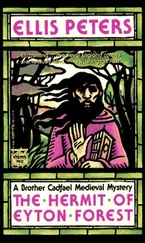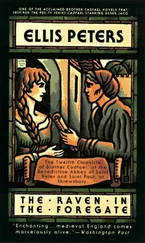Ellis Peters - The Devil's Novice
Здесь есть возможность читать онлайн «Ellis Peters - The Devil's Novice» весь текст электронной книги совершенно бесплатно (целиком полную версию без сокращений). В некоторых случаях можно слушать аудио, скачать через торрент в формате fb2 и присутствует краткое содержание. Жанр: Старинная литература, на английском языке. Описание произведения, (предисловие) а так же отзывы посетителей доступны на портале библиотеки ЛибКат.
- Название:The Devil's Novice
- Автор:
- Жанр:
- Год:неизвестен
- ISBN:нет данных
- Рейтинг книги:3 / 5. Голосов: 1
-
Избранное:Добавить в избранное
- Отзывы:
-
Ваша оценка:
- 60
- 1
- 2
- 3
- 4
- 5
The Devil's Novice: краткое содержание, описание и аннотация
Предлагаем к чтению аннотацию, описание, краткое содержание или предисловие (зависит от того, что написал сам автор книги «The Devil's Novice»). Если вы не нашли необходимую информацию о книге — напишите в комментариях, мы постараемся отыскать её.
The Devil's Novice — читать онлайн бесплатно полную книгу (весь текст) целиком
Ниже представлен текст книги, разбитый по страницам. Система сохранения места последней прочитанной страницы, позволяет с удобством читать онлайн бесплатно книгу «The Devil's Novice», без необходимости каждый раз заново искать на чём Вы остановились. Поставьте закладку, и сможете в любой момент перейти на страницу, на которой закончили чтение.
Интервал:
Закладка:
And with that he pinched out the wick of the lamp, and in the darkness went to thump on the door to be let out.
It was a question, when Cadfael visited next morning, which of them was the more aloof and wary with the other, each of them having given away rather more than he had intended. Plainly there was to be no more of that. Meriet had put on an austere and composed face, not admitting to any weakness, and Cadfael was gruff and practical, and after a look at the little that was still visible of the damage to his difficult patient, pronounced him in no more need of doctoring, but very well able to concentrate on his reading, and make the most of his penitential time for the good of his soul.
“Does that mean,” asked Meriet directly, “that you are washing your hands of me?”
“It means I have no more excuse for demanding entry here, when you are supposed to be reflecting on your sins in solitude.”
Meriet scowled briefly at the stones of the wall, and then said stiffly: “It is not that you fear I’ll take some liberty because of what you were so good as to confide to me? I shall never say a word, unless to you and at your instance.”
“No such thought ever entered my mind,” Cadfael assured him, startled and touched. “Do you think I would have said it to a blabbermouth who would not know a confidence when one was offered him? No, it’s simply that I have no warranty to go in and out here without good reason, and I must abide by the rules as you must.”
The fragile ice had already melted. “A pity, though,” said Meriet, unbending with a sudden smile which Cadfael recalled afterwards as both startlingly sweet and extraordinarily sad. “I reflect on my sins much better when you are here scolding. In solitude I still find myself thinking how much I would like to make Brother Jerome eat his own sandals.”
“We’ll consider that a confession in itself,” said Cadfael, “and one that had better not be made to any other ears. And your penance will be to make do without me until your ten days of mortification are up. I doubt you’re incorrigible and past praying for, but we can but try.”
He was at the door when Meriet asked anxiously: “Brother Cadfael…?” And when he turned at once: “Do you know what they mean to do with me afterwards?”
“Not to discard you, at all events,” said Cadfael, and saw no reason why he should not tell him what was planned for him. It seemed that nothing was changed. The news that he was in no danger of banishment from his chosen field calmed, reassured, placated Meriet; it was all that he wanted to hear. But it did not make him happy.
Cadfael went away discouraged, and was cantankerous with everyone who came in his path for the rest of the day.
CHAPTER SEVEN
« ^ »
Hugh came south from the peat-hags empty-handed to his house in Shrewsbury, and sent an invitation to Cadfael to join him at supper on the evening of his return. To such occasional visits Cadfael had the most unexceptionable claim, since Giles Beringar, now some ten months old, was his godson, and a good godfather must keep a close eye on the welfare and progress of his charge. Of young Gile’s physical well being and inexhaustible energy there could be little question, but Hugh did sometimes express doubts about his moral inclinations, and like most fathers, detailed his son’s ingenious villainies with respect and pride.
Aline, having fed and wined her menfolk, and observed with a practised eye the first droop of her son’s eyelids, swept him off out of the room to be put to bed by Constance, who was his devoted slave, as she had been loyal friend and servant to his mother from childhood. Hugh and Cadfael were left alone for a while to exchange such information as they had. But the sum of it was sadly little.
“The men of the moss,” said Hugh, “are confident that not one of them has seen hide or hair of a stranger, whether victim or malefactor. Yet the plain fact is that the horse reached the moss, and the man surely cannot have been far away. It still seems to me that he lies somewhere in those peat-pools, and we are never likely to see or hear of him again. I have sent to Canon Eluard to try and find out what he carried on him. I gather he went very well-presented and was given to wearing jewels. Enough to tempt footpads. But if that was the way of it, it seems to be a first venture from farther north, and it may well be that our scourings there have warned off the maurauders from coming that way again for a while. There have been no other travellers molested in those parts. And indeed, strangers in the moss would be in some peril themselves. You need to know the safe places to tread. Still, for all I can see, that is what happened to Peter Clemence. I’ve left a sergeant and a couple of men up there, and the natives are on the watch for us, too.”
Cadfael could not but agree that this was the likeliest answer to the loss of a man. “And yet… you know and I know that because one event follows another, it is not necessary the one should have caused the other. And yet the mind is so constructed, it cannot break the bond between the two. And here were two events, both unexpected; Clemence visited and departed—for he did depart, not one but four people rode a piece with him and said farewell to him in goodwill—and two days later the younger son of the house declared his intent to take the cowl. There is no sensible connection, and I cannot reeve the two apart.”
“Does that mean,” demanded Hugh plainly, “that you think this boy may have had a hand in a man’s death and be taking refuge in the cloister?”
“No,” said Cadfael decidedly. “Don’t ask what is in my mind, for all I find there is mist and confusion, but whatever lies behind the mist, I feel certain it is not that. What his motive is I dare not guess, but I do not believe it is blood-guilt.” And even as he said and meant it, he saw again Brother Wolstan prone and bleeding in the orchard grass, and Meriet’s face fallen into a frozen mask of horror.
“For all that—and I respect what you say—I would like to keep a hand on this strange young man. A hand I can close at any moment if ever I should so wish,’ said Hugh honestly. “And you tell me he is to go to Saint Giles? To the very edge of town, close to woods and open heaths!”
“You need not fret,” said Cadfael, “he will not run. He has nowhere to run to, for whatever else is true, his father is utterly estranged from him and would refuse to take him in. But he will not run because he does not wish to. The only haste he still nurses is to rush into his final vows and be done with it, and beyond deliverance.”
“It’s perpetual imprisonment he’s seeking, then? Not escape?” said Hugh, with his dark head on one side, and a rueful and affectionate smile on his lips.
“Not escape, no. From all I have seen,” said Cadfael heavily, “he knows of no way of escape, anywhere, for him.”
At the end of his penance Meriet came forth from his cell, blinking even at the subdued light of a November morning after the chill dimness within, and was presented at chapter before austere, unrevealing faces to ask pardon for his offences and acknowledge the justice of his penalty, which he did, to Cadfael’s relief and admiration, with a calm and dignified bearing and a quiet voice. He looked thinner for his low diet, and his summer brown, smooth copper when he came, had faded into dark, creamy ivory, for though he tanned richly, he had little colour beneath the skin except when enraged. He was docile enough now, or had discovered how to withdraw into himself so far that curiosity, censure and animosity should not be able to move him.
“I desire,” he said, “to learn what is due from me and to deliver it faithfully. I am here to be disposed of as may best be fitting.”
Читать дальшеИнтервал:
Закладка:
Похожие книги на «The Devil's Novice»
Представляем Вашему вниманию похожие книги на «The Devil's Novice» списком для выбора. Мы отобрали схожую по названию и смыслу литературу в надежде предоставить читателям больше вариантов отыскать новые, интересные, ещё непрочитанные произведения.
Обсуждение, отзывы о книге «The Devil's Novice» и просто собственные мнения читателей. Оставьте ваши комментарии, напишите, что Вы думаете о произведении, его смысле или главных героях. Укажите что конкретно понравилось, а что нет, и почему Вы так считаете.












